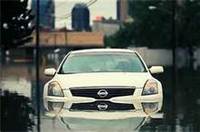Hurricane-Flooded Cars for Sale! Car Buyers Beware
 |
In the wake of Hurricane Sandy, flood-damaged cars may "flood" the used car market. Prospective car buyers should be wary.
KIRKLAND, WA--Nov. 9, 2012: Whether it's a Bentley, Aston Martin, or Harley Davidson, Hurricane Sandy didn't exclude anything. Cars, trucks, and motorcycles alike have been damaged by one of the biggest superstorms to hit the east coast. What happens to those cars? A lot of them may end up for sale in the used car market.
Auto industry experts are forecasting that this calamity will have a larger impact on the auto industry than Katrina did. Going back in 2005, Hurricane Katrina damaged approximately 640,000 vehicles in the Gulf Coast. VinAudit.com, a vehicle history reporting service, reports that many cars damaged by Hurricane Katrina are still on the market today. With Hurricane Sandy hitting a larger region based on population, we can expect history to repeat itself.
Flooded cars are not easily identified. Many states, such as New York and New Jersey, have laws that for branding vehicles damaged by flooding. But crooked dealers or owners can often move cars to other states where a clean title can be issued-- a practice known as "title washing."
After Hurricane Katrina, authorities reported truckloads of flooded vehicles being taken out to other states, where they were dried out, cleaned, and readied for sale to unsuspecting consumers. Prospective purchasers of these vehicles may not have known that the vehicles had been subjected to a saltwater flood, making the vehicles' engine controllers, airbag systems and other electronic systems prone to failure.
So how can we check whether a vehicle for sale has been previously flood-damaged? There's good news here: a national database called the National Motor Vehicle Title Information System (NMVTIS) aggregates data from state DMVs, salvage yards, and insurance carriers into a national repository of historical records-- records that cannot be "washed." Used by law enforcement to trace vehicles across state lines, the NMVTIS database can also be accessed by consumers online through www.vinaudit.com, hosted by approved NMVTIS access provider VinAudit. Private vehicle history reporting companies like Carfax maintain an independent database and serve as an alternate source.
Of course, checking the car itself is as important as checking historical brand records. VinAudit recommends that consumers also obtain a vehicle inspection by an AES-certified mechanic and to be wary of deals that are too good to be true. The saying "trust, but verify" can just as well be applied here.


